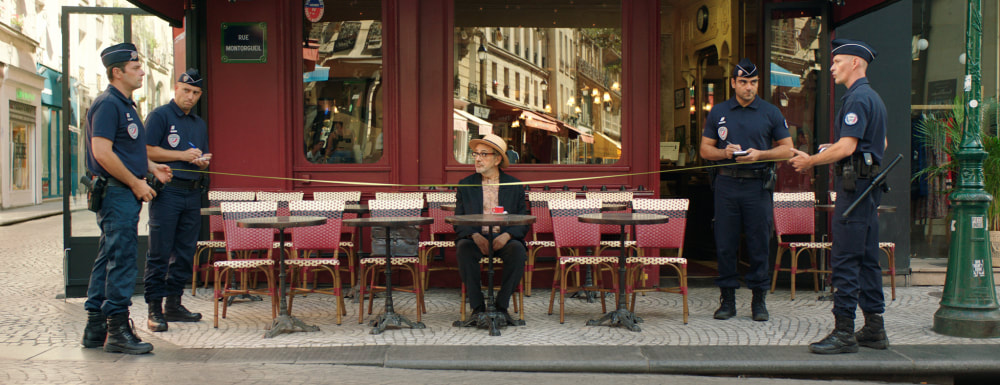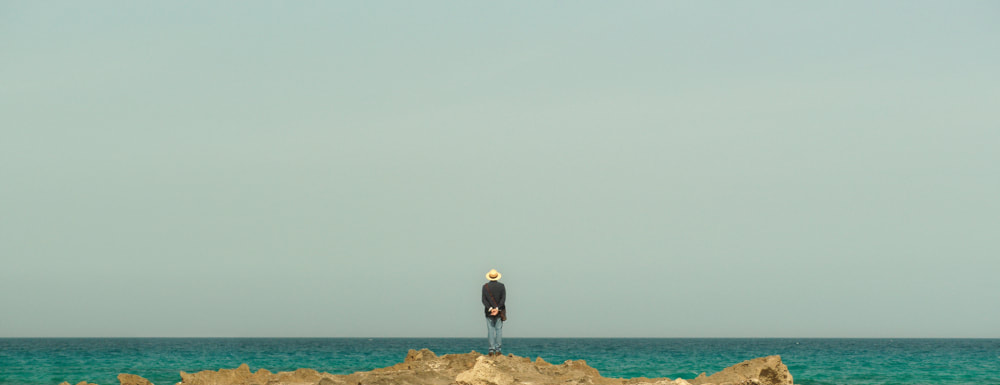IT MUST BE HEAVEN
****
Director: Elia Suleiman
Screenwriter: Elia Suleiman
Principal cast:
Elia Suleiman
Tarik Kopty
Kareem Ghneim
George Khleifi
Grégoire Colin
Gael Garcia Bernal
Country: Canada/France/Germany/Palestine/Turkey/Qatar
Classification: M
Runtime: 102 mins.
Australian release date: Thursday 2 July 2020.
The Nazareth-born Palestinian Elia Suleiman is a unique director who has carved out his own niche style of filmmaking. His films contain almost no dialogue and his eye-level camera barely moves, capturing mainly static rather than kinetic images of the world he sees. It’s a subtle way of observing the world, one that leaves the viewer to ‘judge’ the meaning of what is observed. It’s often wry and droll, in the manner of some Northern European directors like Roy Andersson and Aki Kaurismäki, and frequently very funny… in an anomalous kind of way. Suleiman explains that, “what is spoken is more like monologue to infuse rhythm and musicality. Otherwise the narrative of the film is knitted from a subliminal montage; scenes that are composed from choreographic movements; burlesque drawn from the world of the absurd; images that open up to the poetry of silence, which is at the heart of cinematic language.”
His most recent film, It Must Be Heaven, won the Critics’ Prize at last year’s Cannes Film Festival and it’s easy to see why. Languidly shot in Cinemascope, it follows its protagonist (referred to only as ES, played by Elia Suleiman himself) as he travels from Palestine to Paris and New York, ostensibly to raise the money to make the film we are viewing. As he does, he silently observes life’s little absurdities and there are plenty of them on offer. The movie’s tone is set from the beginning, as we follow a solemn religious procession to a tomb under a church but when the pious group arrives the inebriated crypt-keepers refuse to open the gates. From then on, we are privy to a series of vignettes of strange, off-kilter behaviour as seen through the eyes of ES: a neighbour blatantly steals his lemons; a waiter proffers him a bottle of wine with no label; an armed gang of thugs turns bashful and stops following him when he turns to face them; two cops watch a man throw a glass bottle at a wall and don’t react; he walks through the streets of Paris, a city almost completely devoid of people; and much, much more.
What is It Must Be Heaven really about? Under the covers, it’s an examination of what ‘home’ means and it bears out that old adage about always taking your baggage with you wherever you go. Although ES leaves his home and travels to foreign lands, he finds that home goes with him - it’s inescapable. Suleiman describes it thus: “If my previous films tried to present Palestine as a microcosm of the world; my new film It Must Be Heaven tries to show the world as if it were a microcosm of Palestine.” In other words, there are checkpoints, sirens, excessive security, eruptions of violence and tension all over the world, but there are also the personal moments, the small things, the little intimacies, that make us human and they, too, occur everywhere. This film focuses on the margins, rather than the big picture, and by doing so, it reveals our common ground.
It Must Be Heaven is an unconventional movie that manages to be simultaneously both profound and absurd, pretty much like life itself. And, like life, you shouldn’t let it pass you by.
Screenwriter: Elia Suleiman
Principal cast:
Elia Suleiman
Tarik Kopty
Kareem Ghneim
George Khleifi
Grégoire Colin
Gael Garcia Bernal
Country: Canada/France/Germany/Palestine/Turkey/Qatar
Classification: M
Runtime: 102 mins.
Australian release date: Thursday 2 July 2020.
The Nazareth-born Palestinian Elia Suleiman is a unique director who has carved out his own niche style of filmmaking. His films contain almost no dialogue and his eye-level camera barely moves, capturing mainly static rather than kinetic images of the world he sees. It’s a subtle way of observing the world, one that leaves the viewer to ‘judge’ the meaning of what is observed. It’s often wry and droll, in the manner of some Northern European directors like Roy Andersson and Aki Kaurismäki, and frequently very funny… in an anomalous kind of way. Suleiman explains that, “what is spoken is more like monologue to infuse rhythm and musicality. Otherwise the narrative of the film is knitted from a subliminal montage; scenes that are composed from choreographic movements; burlesque drawn from the world of the absurd; images that open up to the poetry of silence, which is at the heart of cinematic language.”
His most recent film, It Must Be Heaven, won the Critics’ Prize at last year’s Cannes Film Festival and it’s easy to see why. Languidly shot in Cinemascope, it follows its protagonist (referred to only as ES, played by Elia Suleiman himself) as he travels from Palestine to Paris and New York, ostensibly to raise the money to make the film we are viewing. As he does, he silently observes life’s little absurdities and there are plenty of them on offer. The movie’s tone is set from the beginning, as we follow a solemn religious procession to a tomb under a church but when the pious group arrives the inebriated crypt-keepers refuse to open the gates. From then on, we are privy to a series of vignettes of strange, off-kilter behaviour as seen through the eyes of ES: a neighbour blatantly steals his lemons; a waiter proffers him a bottle of wine with no label; an armed gang of thugs turns bashful and stops following him when he turns to face them; two cops watch a man throw a glass bottle at a wall and don’t react; he walks through the streets of Paris, a city almost completely devoid of people; and much, much more.
What is It Must Be Heaven really about? Under the covers, it’s an examination of what ‘home’ means and it bears out that old adage about always taking your baggage with you wherever you go. Although ES leaves his home and travels to foreign lands, he finds that home goes with him - it’s inescapable. Suleiman describes it thus: “If my previous films tried to present Palestine as a microcosm of the world; my new film It Must Be Heaven tries to show the world as if it were a microcosm of Palestine.” In other words, there are checkpoints, sirens, excessive security, eruptions of violence and tension all over the world, but there are also the personal moments, the small things, the little intimacies, that make us human and they, too, occur everywhere. This film focuses on the margins, rather than the big picture, and by doing so, it reveals our common ground.
It Must Be Heaven is an unconventional movie that manages to be simultaneously both profound and absurd, pretty much like life itself. And, like life, you shouldn’t let it pass you by.

